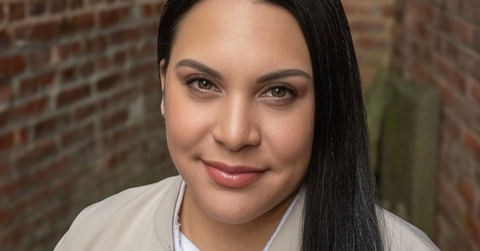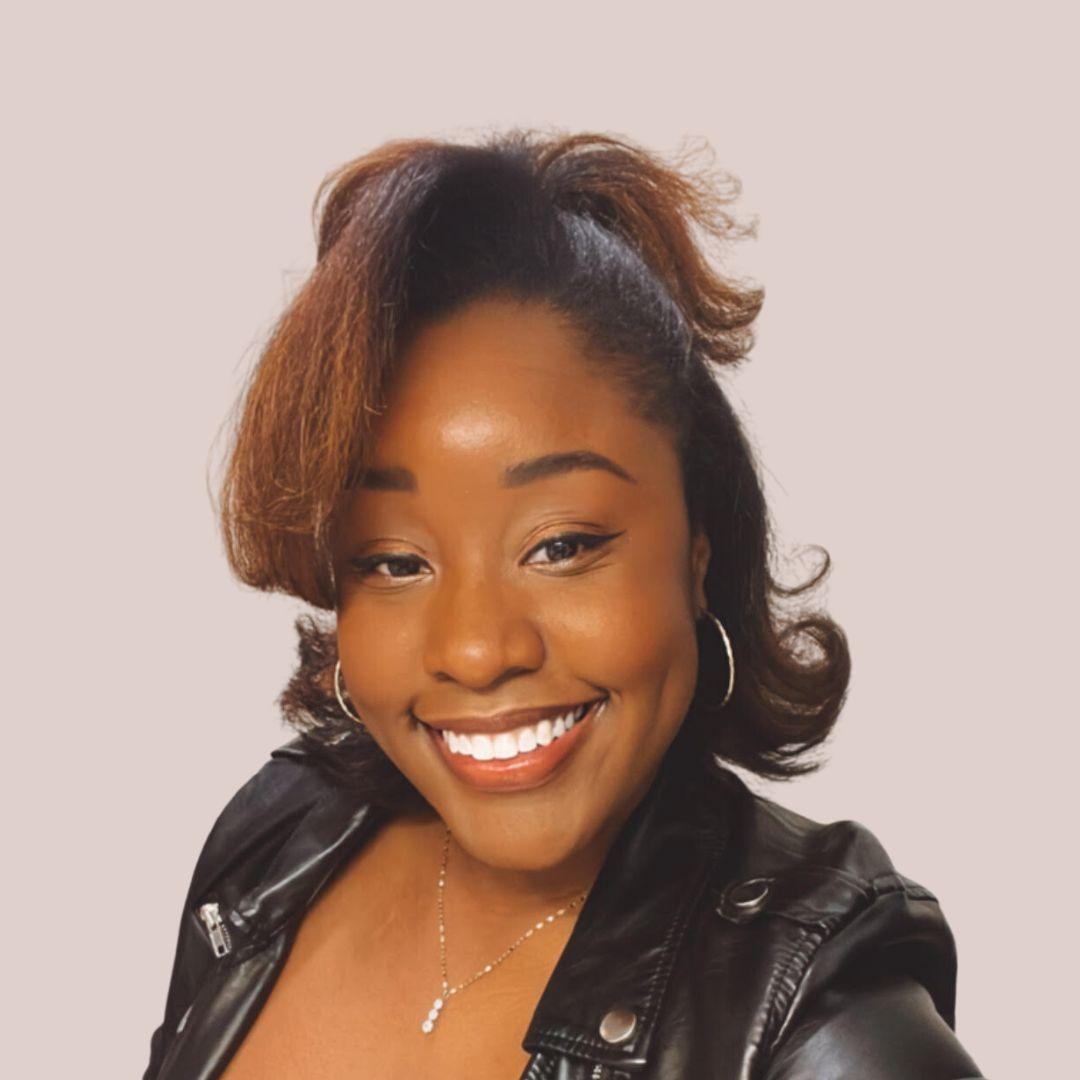While some people master one role in the filmmaking industry, Ashley L. Canfield has found her niche in three, with writing, directing, and producing serving as powerful outlets for telling stories that matter. Born and raised in The Bronx, New York, her goal has always been to blend her passion for storytelling with her commitment to uplifting underrepresented voices in the film industry. Now billed as a producer, director, and lead writer, she’s finally making an impact. Her journey from the theater stages of New York to the collaborative sets of independent films is a testament to her versatility and dedication.
Her career began in theater with her play, Dirt is Where Flowers Grow. It premiered in 2017 at Teatro La Tea and this debut marked the beginning of a series of successes. Just a few years later in 2021, her award-winning short play Papi, took first place at the Nuyorican Poets Cafe Theatre Festival. Her ability to capture the nuances of the human experience, especially from the Latin perspective as a Puerto Rican woman, has made her a standout in both the theater and film communities. Her heritage provides a fresh perspective to what is most often shown in popular films today. While more Latin actors are finding success on screen, there is still room for improvement with Latin representation behind the camera. According to the 2023 UCLA Hollywood Diversity Report, only 4.5% of directors and 5.7% of screenwriters were Latin. This data underscores the ongoing need for greater inclusion and opportunities for Latin creatives in the film industry.
Transitioning from acting to writing and directing, Ashley has navigated the challenges of limited budgets and tight schedules with ingenuity. Her work in film, including the critically acclaimed Papi and the upcoming film Closure, premiering at the Big Apple Film Festival this month, showcases her talent for creating compelling narratives that resonate with diverse audiences. Through her production company, Wyld Child, which she co-created with her husband, Producer Edward F. Canfield, she continues to push the boundaries of storytelling, exploring universal themes like resilience, grief, family, and love that connect us all.
Beyond her creative endeavors, Ashley is also a dedicated advocate for diversity in the arts. As the co-founder and Executive Director of Blended City, she provides workshops, mentorship, and performance opportunities for underrepresented artists in New York. Her commitment to fostering a more inclusive industry is evident in every project she undertakes, making her a true trailblazer in the entertainment world.
Her Agenda chatted with Ashley L. Canfield to delve into her remarkable journey into independent filmmaking, how her Puerto Rican heritage has influenced her storytelling, and her drive to make a difference in the film industry.
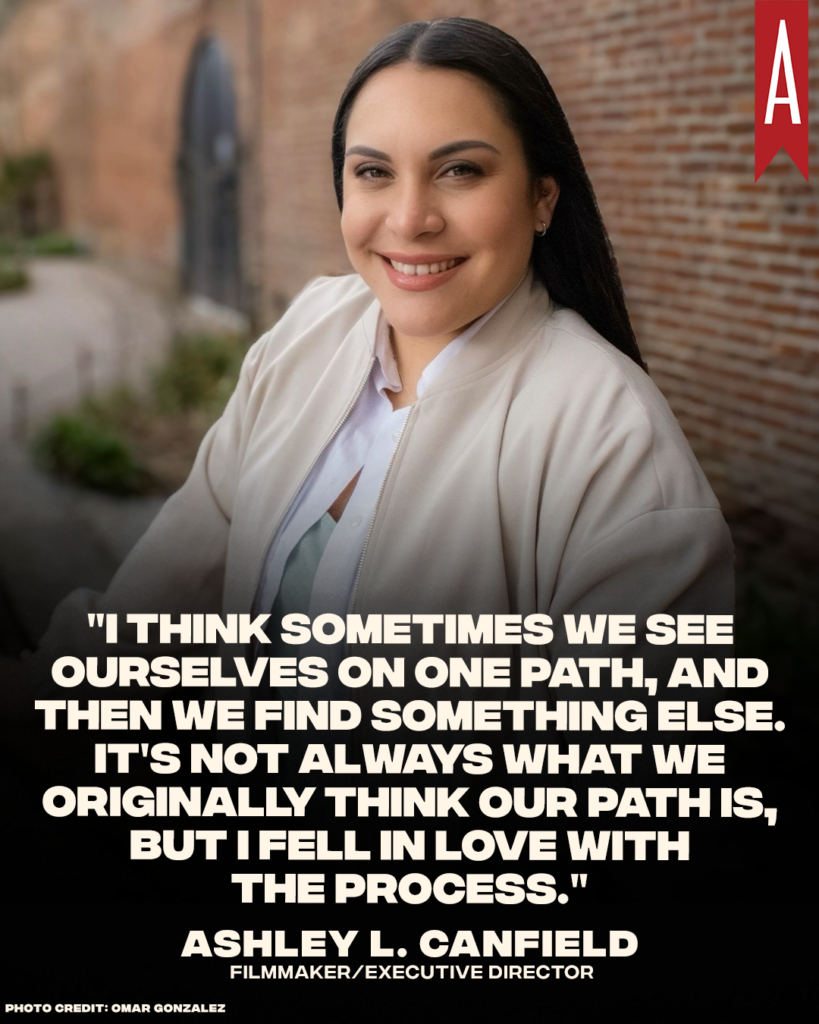
Her Agenda: Your work spans various genres and media, from stage plays to films. How do you approach storytelling differently in each format, and what challenges do you face in adapting your vision across these platforms?
Ashley L. Canfield: So, I started in theater. I was a theater major in college. I pretty much saw my career as an actress for a while, until my mid-20s, and then I got the opportunity to write and direct. I just fell in love with that and I didn’t look back. I think sometimes we see ourselves on one path, and then we find something else. It’s not always what we originally think our path is, but I fell in love with the process.
I will say that theater is very different in the sense that the medium is really for actors. A lot of people will say that as a director, you do your best and you can have this very specific vision, but at the end of the day, what’s put up on stage is really up to the actors that night. I always struggled with that a little bit. It might be because of my perfectionist habits or something, but I just wanted to find a different medium to tell stories.
I love theater, but I always would find myself having these intricate ideas or things that might be hard to pull off on stage, especially when you’re working with a small budget. Film is completely different. Everything is in pre-production, and it’s all about preparation. What could go wrong? What could we need? What could happen on set? How do we pivot? How do we leverage certain situations? And then even with the most preparation you could possibly have, there’s still going to be things that go wrong. And you have to be ready to just grow with it. It’s a very fast-paced thing, but in the end it’s all storytelling. That’s what’s most important to me, getting that story across and making sure that we all as a team do our best. The story is king.
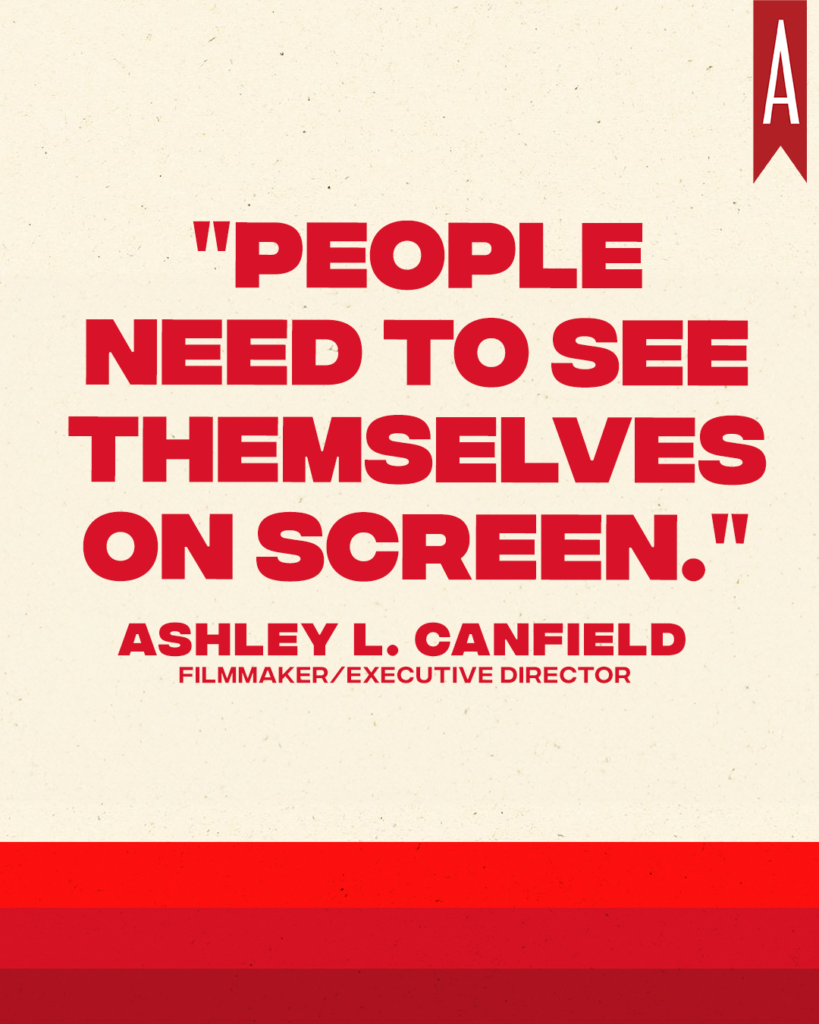
Her Agenda: ‘Papi’ has received significant recognition, including winning first place at the Nuyorican Poets Cafe Theatre Festival. What inspired you to write this play, and how do you feel its themes resonate with audiences today?
Ashley L. Canfield: I wanted it to take place in one [location]. And I wanted to write about a family. I really wanted to show the dynamics of a Puerto Rican family that has all these different characters, but make it very relatable. The whole premise was that the family was coming together in a little hospital waiting room because the father was sick.
I was fleshing out this story, and then the pandemic hit. When the pandemic hit and the theater closed, I pivoted. The Nuyorican decided to do the theater festival online, so I made it work as a short. I got the idea to have it take place on Zoom. My husband’s family actually had lost someone to COVID and I just remembered that time of everyone meeting on video to connect and support each other. I wanted to integrate that into the story because it was a universal [experience]. We all have to go through losing someone, and I decided to add that aspect of COVID.
But underneath, what it’s really about is a son trying to reconcile with his father, who he’s losing and who he has a fractured relationship with. I feel like that’s really the heart of the story, and that’s something that everyone can relate to at some point in their life. The core of it is the family, and looking for that reconciliation in a time where you might not get that. That’s what hits everyone for sure.
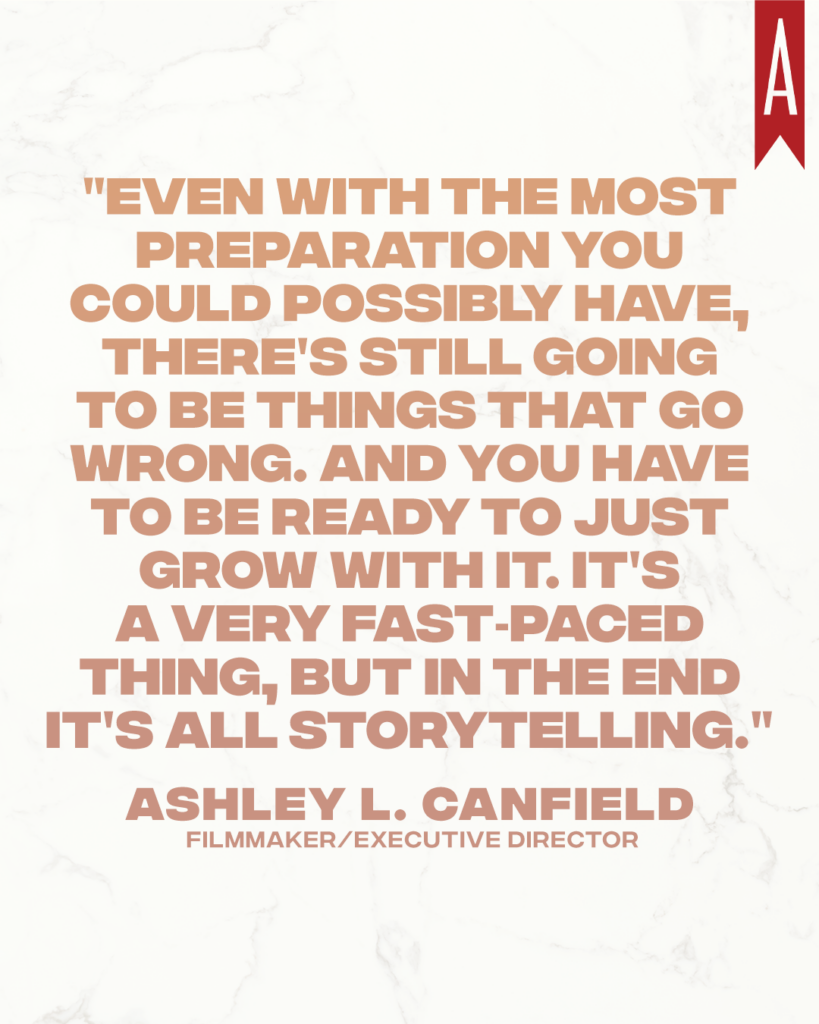
Her Agenda: Your film ‘POKENO’ was selected for the Latino Film Market and Mott Haven Film Festival. What was the creative process behind ‘POKENO,’ and what did you learn while on set?
Ashley L. Canfield: So that was written by my friend, who went through that situation. It was therapeutic for him to write about it. And then he asked me to direct it. That was a different process for me because I didn’t write it myself. I wanted to do it justice, so I got a lot of insight from him about what the story was and how his character was feeling. And then I just applied and worked with my actors to tell this story of this family game night gone wrong.
That was the first shoot I did after pivoting from theater. So that was fun and exciting, but also nerve wracking. It was very intense because we had one day to shoot this. But we had a lot of people who were down to make this short film. I would say my vision came across. It was my first time on a film set and doing this type of medium, I did learn a lot from the experience.
It’s hard when you have this vision, and then you get to the editing room, and you’re like, oh, this is not what I wanted, or this is not what I thought we got. Then you start thinking back to that time on set, and like, oh well, yeah, we were running out of time, so we had to cut that shot, or we couldn’t do this, or I couldn’t get this scene. I learned from that, and then I told myself, you know what, next time, one, I’m not going to think that I can shoot a whole short in one day. Even if it could be done, why put yourself in that position, right? Why the stress?
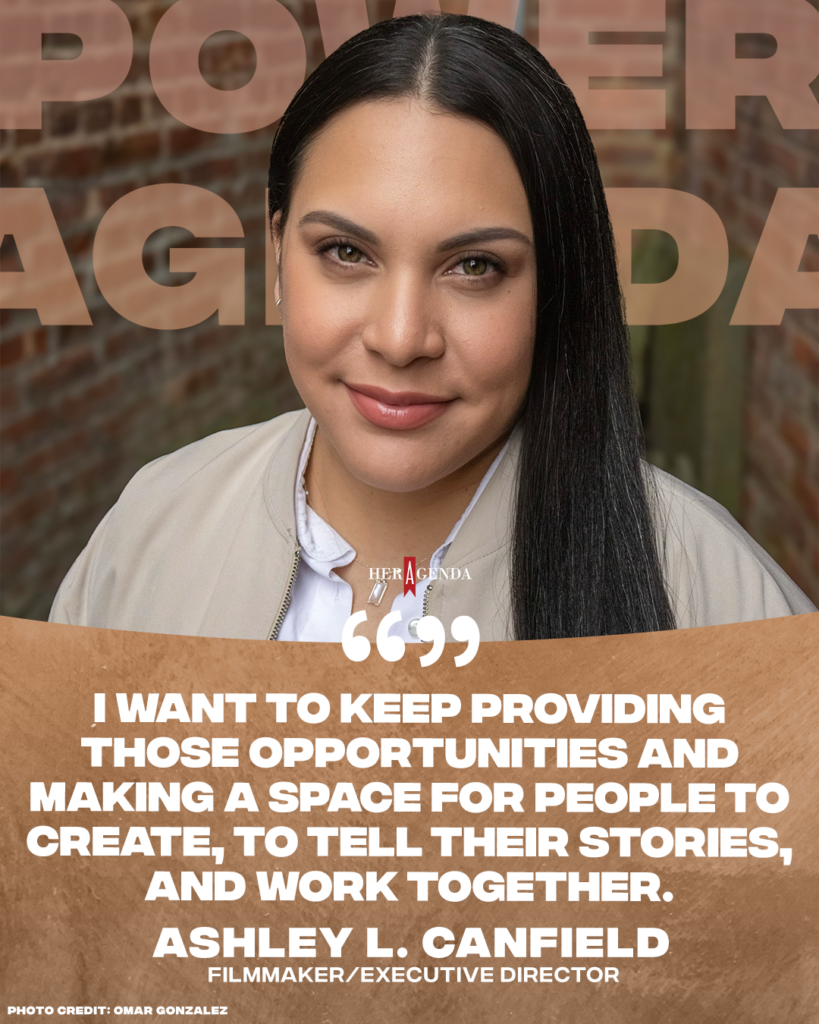
Her Agenda: As the co-founder and Executive Artistic Director of Blended City, you’ve supported underrepresented artists in disadvantaged communities. Can you share a memorable experience or success story from your work with Blended City?
Ashley L. Canfield: I co-founded Blended City in 2017, and the idea was just to create a community. You know, when you’re an artist, it’s very lonely sometimes. And when you’re starting, it’s hard to find those opportunities. I wanted to create something that would be that place for people, whether they were newcomers to the arts or just out of school, or if they were pivoting careers themselves and needed to make connections, network, and find opportunities. So that was always my goal.
We support and connect New York City artists in theater, film and music. I saw that a lot of our community were mostly actors, filmmakers or theater directors and a lot of musicians. So I was like, you know what? Let’s really create a community where these artists can connect and create together and make opportunities for each other.
We do this by providing free to low-cost workshops. We recently had the editor from Severance, Erica Freed. She’s Emmy-nominated and very established. So we had her come out and talk to some of our community members, and it was a free event. I definitely want to keep growing our offerings to our communities. I didn’t have that when I was younger and looking for opportunities. We’re also giving them a chance to perform. We have yearly showcases where we try to get agents and managers that we’ve met along the way in order to build a type of community.
Her Agenda: Wyld Child aims to create films that explore universal human experiences. What motivated you to start this production company, and how do you ensure your films resonate with diverse audiences?
Ashley L. Canfield: I started Wyld Child with my husband, Edward F. Canfield, after I knew I wanted to make more films. The actor I met when I casted for Papi, John Anthony Torres, actually came to me and asked me if I wanted to do another film. So I thought, I should start a production company. My husband produces with me as well. We’re a married producing duo.
We decided to focus on telling stories that resonate with everyone, but are told by diverse people. Our new film, Closure, is coming out this year. It’s inspired by a play written by Luis Roberto Herrera. He gave us the rights. We shot it with an all-Latino cast under our production company Wyld Child, and in collaboration with our executive producer, VOE Coqui Productions. I think it’s very important that we cast the film that way because representation matters so much and we need to see our people in those lead roles. I think it’s so important because people need to see themselves on screen.
It’s insane, you know. We are still hearing about these firsts, and we have to keep making the firsts so that there can be seconds, thirds, and fourths. We’re making history, and we have to keep working towards those things so that we can be a part of that story.
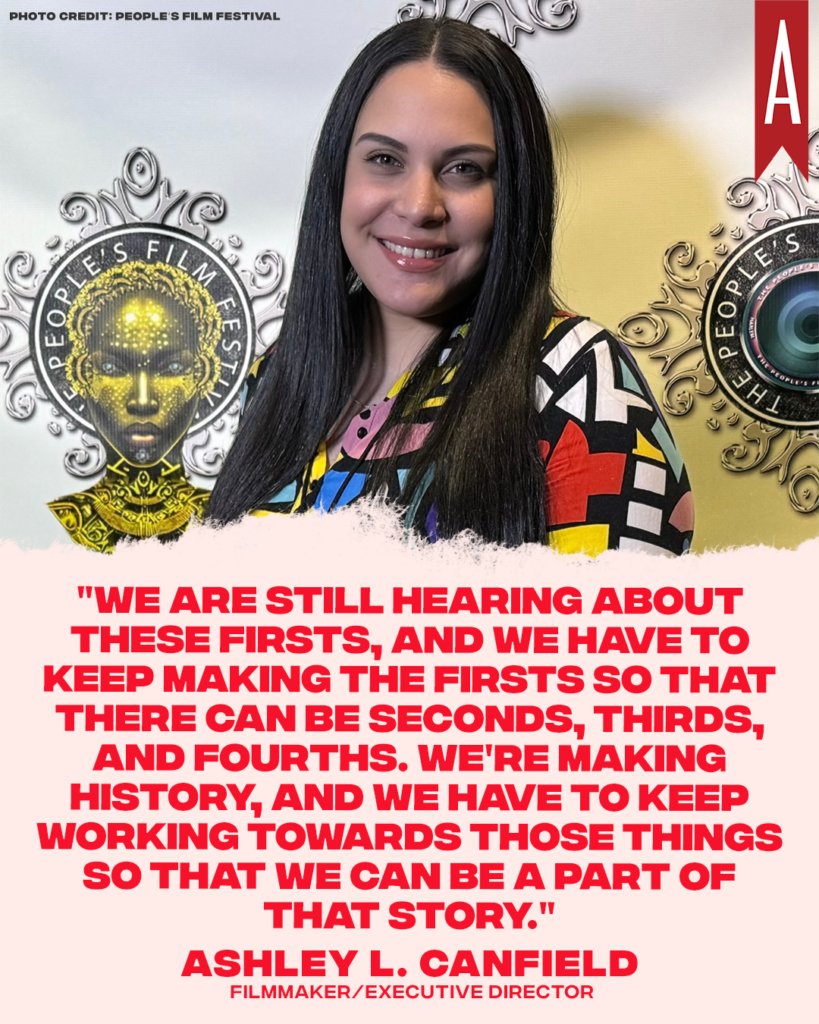
Her Agenda: Looking ahead, what are your aspirations for the future of Blended City and Wyld Child, and how do you envision your role in shaping the impact of theater and film?
Ashley L. Canfield: My goals are just to keep making stories and creating opportunities. With Blended City, same thing. I want to keep providing those opportunities and making a space for people to create, to tell their stories, and work together. Whatever it takes, get them made, get them produced, make those opportunities, and then put them out there for everyone to see.
I have a son, and I want to just keep showing him. He’s little—he’s two years old—but when he is old enough, I want him to look and say, ‘Oh, mom followed her dreams.’ That’s it. That’s my goal—to follow my dream and for him to see that since I did it, you have to do it. You have to follow your dream because I didn’t give up, and I did what I felt called to do. Storytelling is what I feel called to do, whether that’s in theater, whether it’s in film, whether it’s in a workshop, or just having a conversation with someone. That’s my path, which is why I’m here. The human condition is so complicated. It’s so complex. It’s so vast. But at the end of the day, we’re all connected. Everyone is just experiencing life in different ways. I want to show as many of those ways as I can to be a part of connecting us further.
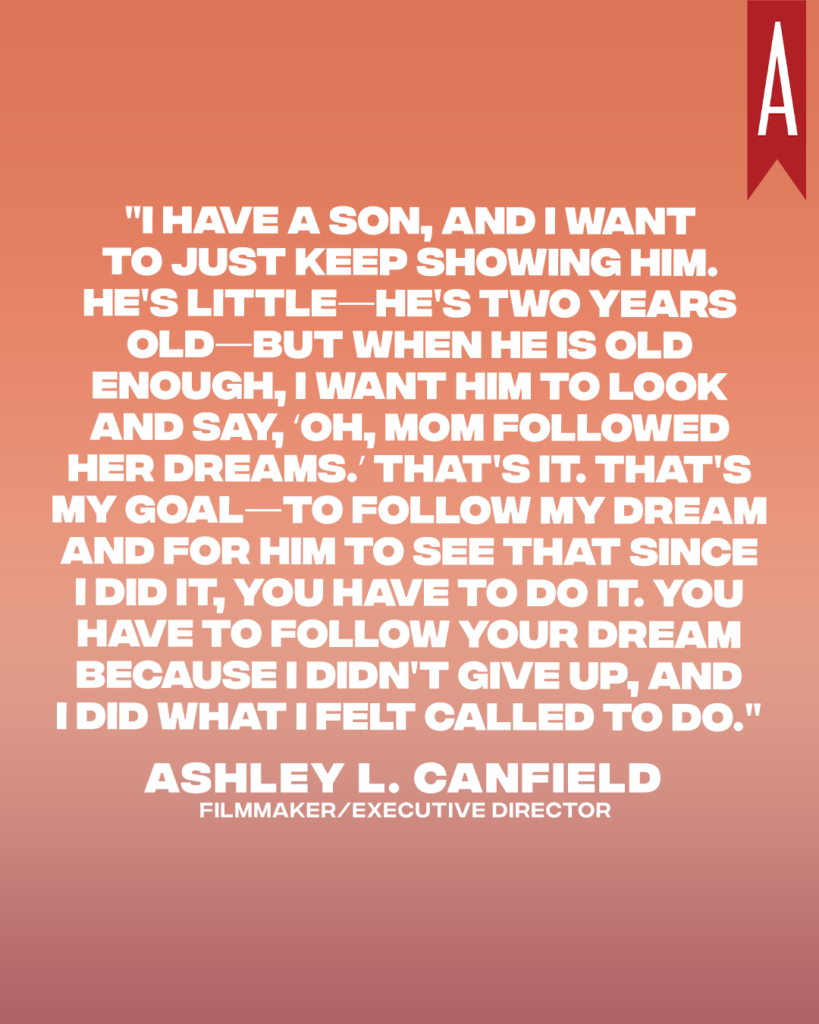
[Editor’s note: This interview has been edited for length and clarity.]

